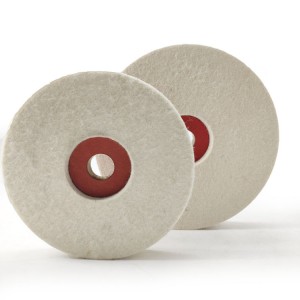The integration of artificial intelligence (AI) into the realm of wool felt wheels is heralding a new era of precision and efficiency in the polishing industry. As technology continues to permeate every aspect of manufacturing and production, wool felt wheel manufacturers are leveraging AI to enhance product performance, optimize usage, and streamline operations.
AI – powered sensors are being embedded within wool felt wheels, enabling real – time monitoring of various parameters during the polishing process. These sensors can detect factors such as temperature, pressure, rotational speed, and the degree of wear on the wheel. By continuously collecting and analyzing this data, AI algorithms can provide immediate feedback to operators, ensuring that the polishing process is carried out under optimal conditions. For example, if the sensor detects that the temperature of the wheel is rising too high, indicating excessive friction, the AI system can alert the operator and suggest adjustments to the speed or pressure to prevent damage to both the wheel and the material being polished.
Moreover, AI is being used to predict the lifespan of wool felt wheels with remarkable accuracy. By analyzing historical data on wheel usage, wear patterns, and performance metrics, AI models can forecast when a wheel is likely to reach the end of its service life. This predictive maintenance feature allows companies to schedule wheel replacements in advance, minimizing unexpected downtime in production lines. It also helps in optimizing inventory management, as businesses can ensure they have the right number of replacement wheels on hand at the appropriate times.
In the design and development phase, AI – driven simulations are revolutionizing the creation of wool felt wheels. Manufacturers can use AI algorithms to model different fiber arrangements, densities, and bonding techniques, predicting how each design will perform in various polishing scenarios. This virtual prototyping approach significantly reduces the time and cost associated with traditional trial – and – error methods. By quickly identifying the most promising designs, companies can bring innovative wool felt wheels to market faster, meeting the evolving needs of customers.
AI is also facilitating personalized product recommendations for users. Online platforms selling wool felt wheels can use AI – based algorithms to analyze customer data, including past purchases, project types, and material preferences. Based on this analysis, the system can recommend the most suitable wool felt wheels for specific tasks, enhancing the customer shopping experience and increasing customer satisfaction.
While the integration of AI into wool felt wheels offers numerous benefits, it also presents challenges. Issues such as data security, ensuring the reliability of AI algorithms, and the need for skilled personnel to manage and interpret the data are some of the concerns that manufacturers need to address. However, as the technology matures and becomes more accessible, the potential for AI – integrated wool felt wheels to transform the polishing industry is immense.
In the coming years, we can expect to see even more advanced applications of AI in wool felt wheel technology. From fully autonomous polishing systems that can operate without human intervention to AI – enabled quality control processes, the future of wool felt wheels is set to be defined by intelligent innovation.

Post time: Jun-11-2025
